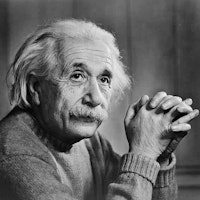Peace cannot be kept by force. It can only be achieved by understanding.
By Understanding
Topic: Global Peace & Development
Peace cannot be kept by force. It can only be achieved by understanding. You cannot subjugate a nation forcibly unless you wipe out every man, woman, and child. Unless you wish to use such drastic measures, you must find a way of settling your disputes without resort to arms.
Albert Einstein, born on 14 March 1879 and passing away on 18 April 1955, stands as one of the most renowned theoretical physicists in history. Best known for his groundbreaking special and general theories of relativity, his scientific endeavors spanned a multitude of areas within the field of physics. Amongst his numerous accolades, he was awarded the Nobel Prize in physics for his elucidation of the photoelectric effect—a phenomenon that expanded the horizons of quantum theory.
Einstein's journey, however, wasn't merely defined by scientific discoveries, but by the myriad challenges he overcame across various dimensions of his life. In his spiritual journey, he grappled with the concepts of God and universe. Socially, he navigated the complexities of his time—facing the rise of anti-Semitism, experiencing exile from his homeland due to Nazi oppression, and advocating for civil rights, disarmament, and global peace. These adversities only strengthened his resolve and underscored his resilience.
Beyond his professional accomplishments, Einstein's life was enriched by a tapestry of relationships and dialogues with luminaries from diverse fields. He engaged in profound conversations on the nature of reality with the likes of the Indian poet Rabindranath Tagore, discussed the principles of non-violence with Mohandas Gandhi, and deliberated on humanitarian issues with Albert Schweitzer. Furthermore, his camaraderie with fellow scientists and physicists provided a fertile ground for intellectual exchanges, fostering an environment of collaboration and innovation during one of the most exciting epochs in scientific history.
Einstein, Albert, and Alice Calaprice. The Expanded Quotable Einstein. Princeton University Press, 2000, p. 158 [New History Society speech (14 December 1930), reprinted in "Militant Pacifism" in Cosmic Religion (1931)].

Albert Einstein
Theme: Peace


About This Albert Einstein Quotation [Commentary]
Albert Einstein’s statement, “Peace cannot be kept by force. It can only be achieved by understanding,” reflects the center of his public ethic. Peace, for Einstein, is not the result of domination or military power. It cannot be enforced. He makes this plain: “You cannot subjugate a nation forcibly unless you wipe out every man, woman, and child.” These words are not hypothetical—they expose the actual logic behind forced peace. Unless such “drastic measures” are acceptable—and Einstein clearly did not accept them—nations must “find a way of settling… disputes without resort to arms.”
Einstein did not separate moral principle from political necessity. Peace, he said elsewhere, “is not merely the absence of war but the presence of justice, of law, of order—in short, of government.” That kind of peace requires more than intention; it calls for understanding and structural cooperation. “Mere praise of peace is easy and ineffective,” he wrote. What is needed is “active participation in the fight against war and everything which leads to it.” The sequence of thought remains consistent: coercion breaks down trust; understanding builds it. Without understanding, there is no true resolution—only delay or suppression.
In the years following World War II, Einstein made repeated appeals to international responsibility. “Peace by law is what the peoples of the world… can have if they want it. And now is the time to get it.” His words continue to challenge the assumption that peace is a passive condition. Peace must be chosen, pursued, and practiced. It is based not in the ability to compel, but in the willingness to understand.
Additional Albert Einstein Quotes
Related Quotes
Copyright © 2017 – 2026 LuminaryQuotes.com About Us